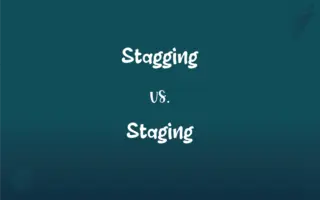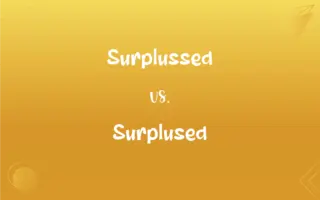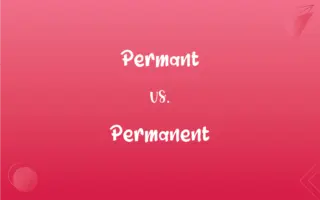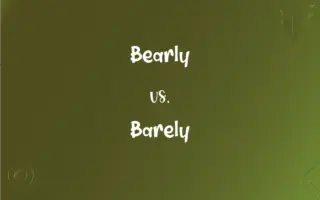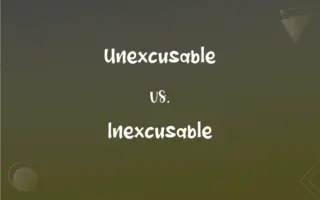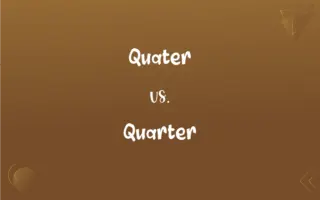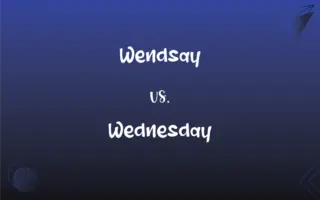Distrub vs. Disturb: Mastering the Correct Spelling
Edited by Harlon Moss || By Janet White || Updated on March 11, 2024
Distrub. Correct: Disturb. To disturb means to interrupt, bother, or unsettle someone or something, often causing discomfort or distraction.

Which is correct: Distrub or Disturb
How to spell Disturb?

Distrub is Incorrect

Disturb is Correct
ADVERTISEMENT
Key Differences
Turbulence Association: Link 'turb' in disturb to 'turbulence,' as both suggest disruption.
Alphabet Order: In 'disturb,' the 's' comes before the 't,' following alphabetical order.
Word Breakdown: Break it as 'dis-turb'; 'dis' for apart, 'turb' for agitate.
Double 'R' Trap: Remember that disturb has only one 'r,' unlike 'distrub.'
Sound Clue: Focus on the 'ur' sound in disturb, which is absent in 'distrub.'
ADVERTISEMENT
Correct usage of Disturb
They asked the tourists not to distrub the wildlife.
They asked the tourists not to disturb the wildlife.
Please try not to distrub your brother while he's studying.
Please try not to disturb your brother while he's studying.
She did not mean to distrub the meeting with her late arrival.
She did not mean to disturb the meeting with her late arrival.
The noise outside began to distrub her concentration.
The noise outside began to disturb her concentration.
He was careful not to distrub the delicate balance of the ecosystem.
He was careful not to disturb the delicate balance of the ecosystem.
Disturb Definitions
To disturb is to interrupt the tranquility or order of something.
Loud noises tend to disturb my concentration.
Disturb implies disrupting normal function or activity.
Construction work can disturb local wildlife.
It can also mean to awaken someone from sleep.
Please don't disturb her; she's resting.
Disturb can mean causing discomfort or agitation.
The news visibly disturbed him.
To disturb means to upset someone’s emotional or mental state.
She didn't want to disturb his happiness with her news.
To break up or destroy the tranquility, order, or settled state of
“Subterranean fires and deep unrest disturb the whole area” (Rachel Carson).
To trouble emotionally or mentally; upset
It disturbed me when you left without saying goodbye.
To interfere with; interrupt
Noise that disturbed my sleep.
To intrude on; inconvenience
Constant calls disturbed her work.
(Physics) To alter or displace (one or more properties of a physical system) away from its equilibrium state.
(transitive) to confuse a quiet, constant state or a calm, continuous flow, in particular: thoughts, actions or liquids.
The noisy ventilation disturbed me during the exam.
The performance was disturbed twice by a ringing mobile phone.
A school of fish disturbed the water.
(transitive) to divert, redirect, or alter by disturbing.
A mudslide disturbed the course of the river.
The trauma disturbed his mind.
(intransitive) to have a negative emotional impact; to cause emotional distress or confusion.
(obsolete) disturbance
To throw into disorder or confusion; to derange; to interrupt the settled state of; to excite from a state of rest.
Preparing to disturbWith all-cofounding war the realms above.
The bellow's noise disturbed his quiet rest.
The utmost which the discontented colonies could do, was to disturb authority.
To agitate the mind of; to deprive of tranquillity; to disquiet; to render uneasy; as, a person is disturbed by receiving an insult, or his mind is disturbed by envy.
To turn from a regular or designed course.
And disturbHis inmost counsels from their destined aim.
Disturbance.
Move deeply;
This book upset me
A troubling thought
Change the arrangement or position of
Tamper with;
Don't touch my CDs!
Destroy the peace or tranquility of;
Don't interrupt me when I'm reading
Damage as if by shaking or jarring;
Don't disturb the patient's wounds by moving him too rapidly!
Disturb Sentences
The construction work did not disturb the tranquility of the neighborhood.
Please do not disturb the sleeping baby.
Loud noises can disturb the nesting birds in the area.
She hates anything that might disturb her morning routine.
He put up a "Do not disturb" sign on his door while studying.
He didn't want to disturb the arrangement of the furniture.
The sudden phone call disturbed her deep in thought.
The light from your phone can disturb others in the cinema.
A gentle nudge was enough to disturb the precarious stack of books.
Sudden changes in temperature can disturb the ecosystem.
A policy change could disturb the industry's status quo.
It's crucial not to disturb the crime scene before the police arrive.
She could easily disturb the surface of the water with a single touch.
To disturb the peace of this place would be a shame.
They requested silence to not disturb the performers.
Avoid doing anything that might disturb the balance of the group.
A knock on the door is enough to disturb his concentration.
They were careful walking through the forest to not disturb the habitat.
Please avoid actions that might disturb the other guests.
Wind can disturb the calm surface of a lake.
Trying not to disturb the water, he moved the boat forward gently.
Disturb me not, for I am deep in meditation.
Even the slightest whisper can disturb the silence of the library.
The idea was not to disturb the natural order of things.
His presence did not seem to disturb the ongoing meeting.
Disturb Idioms & Phrases
Disturb the balance
To disrupt the equilibrium or stability of something.
Adding too many fish to the aquarium can disturb the balance of the ecosystem.
Do not disturb
A request for privacy or to be left alone.
She hung a Do not disturb sign on her door while she was napping.
Disturb the status quo
To challenge or change the current state of affairs.
The new policy disturbed the status quo, leading to significant changes.
Disturb the peace of mind
To disrupt someone's mental calm or serenity.
The constant noise from construction disturbed her peace of mind.
Disturb the waters
To cause trouble or stir up controversy.
His outspoken comments certainly disturbed the waters at the meeting.
Disturb the peace
To cause a commotion or public nuisance.
The loud party next door was disturbing the peace of the neighborhood.
Disturb one's concentration
To interrupt or distract someone's focus.
It's hard to study when loud music is disturbing one's concentration.
Not to disturb
Used to indicate that someone or something should not be bothered.
They were told not to disturb the artifacts in the museum.
Disturb the silence
To break a period of quiet with noise.
The sudden ringing of his phone disturbed the silence of the library.
Disturb the harmony
To disrupt the smooth operation or peacefulness of a group or setting.
Their argument disturbed the harmony of the dinner party.
Disturb the rhythm
To interfere with the regular or expected pattern of something.
Changing the team's lineup disturbed their winning rhythm.
Disturb the process
To interfere with a procedure or course of action.
Interrupting the speaker disturbed the process of the debate.
Disturb the air
To create a disturbance or agitation in the surrounding atmosphere.
The fast-moving train disturbed the air around it.
Disturb one's thoughts
To interrupt or disrupt someone's thinking process.
The unexpected news disturbed his thoughts for the rest of the day.
Disturb the natural order
To interfere with the way things naturally occur.
Introducing non-native species can disturb the natural order of the ecosystem.
Disturb the rest
To interrupt someone's period of relaxation or sleep.
The loud fireworks disturbed the rest of many people in the city.
Disturb the peace of the night
To interrupt the quiet or tranquility of the nighttime.
The howling of stray dogs disturbed the peace of the night.
Disturb the stillness
To disrupt a state of inactivity or calm.
The arrival of the storm disturbed the stillness of the summer afternoon.
Disturb the tranquility
To disrupt a state of peace or calm.
Tourists should be careful not to disturb the tranquility of the secluded beach.
Disturb the flow
To interrupt or alter the continuous progress of something.
Frequent breaks disturb the flow of my work.
FAQs
Why is it called Disturb
The word disturb originates from Latin 'disturbare,' meaning to throw into disorder.
What is the pronunciation of Disturb
Disturb is pronounced as \dɪˈstɜrb.
Which vowel is used before Disturb
The vowel 'u' is used before the 'r' in disturb.
What is the root word of Disturb
The root word is 'turbare' from Latin, meaning to disturb or throw into disorder.
What is the plural form of Disturb
Disturb doesn’t have a plural form as it’s a verb.
Which conjunction is used with Disturb
Conjunctions like "and" and "or" can be used (e.g., disturb and disrupt).
Which article is used with Disturb
As a verb, disturb doesn’t typically use articles.
What is the verb form of Disturb
Disturb itself is the verb form.
Which preposition is used with Disturb
Common prepositions used are "by" and "with" (e.g., disturbed by noise).
Is Disturb a vowel or consonant
The word disturb contains both vowels and consonants.
Is the Disturb term a metaphor
Disturb can be used metaphorically in some contexts.
What is another term for Disturb
Another term for disturb is "disrupt."
What is the singular form of Disturb
The singular form is "disturb."
Is the word Disturb is imperative
Disturb can be used in the imperative form (e.g., “Do not disturb”).
How many syllables are in Disturb
There are two syllables in disturb.
What is the second form of Disturb
The second form is "disturbed."
Is Disturb a noun or adjective
Disturb is a verb.
Is Disturb an adverb
No, disturb is not an adverb.
Is Disturb an abstract noun
Disturb is not a noun; it’s a verb.
Is Disturb a collective noun
No, disturb is not a collective noun.
What part of speech is Disturb
Disturb is a verb.
Which determiner is used with Disturb
As a verb, disturb doesn’t typically use determiners.
What is the first form of Disturb
The first form is "disturb."
How is Disturb used in a sentence
Example: "Please try not to disturb the sleeping baby."
Is Disturb a countable noun
Disturb is not a noun, so it’s neither countable nor uncountable.
What is a stressed syllable in Disturb
The second syllable in disturb is stressed: dis-TURB.
What is the opposite of Disturb
The opposite of disturb is "soothe" or "calm."
Is Disturb a negative or positive word
Disturb is generally considered a negative word.
How do we divide Disturb into syllables
Disturb is divided as dis-turb.
What is the third form of Disturb
The third form is "disturbed."
About Author
Written by
Janet WhiteJanet White has been an esteemed writer and blogger for Difference Wiki. Holding a Master's degree in Science and Medical Journalism from the prestigious Boston University, she has consistently demonstrated her expertise and passion for her field. When she's not immersed in her work, Janet relishes her time exercising, delving into a good book, and cherishing moments with friends and family.
Edited by
Harlon MossHarlon is a seasoned quality moderator and accomplished content writer for Difference Wiki. An alumnus of the prestigious University of California, he earned his degree in Computer Science. Leveraging his academic background, Harlon brings a meticulous and informed perspective to his work, ensuring content accuracy and excellence.


